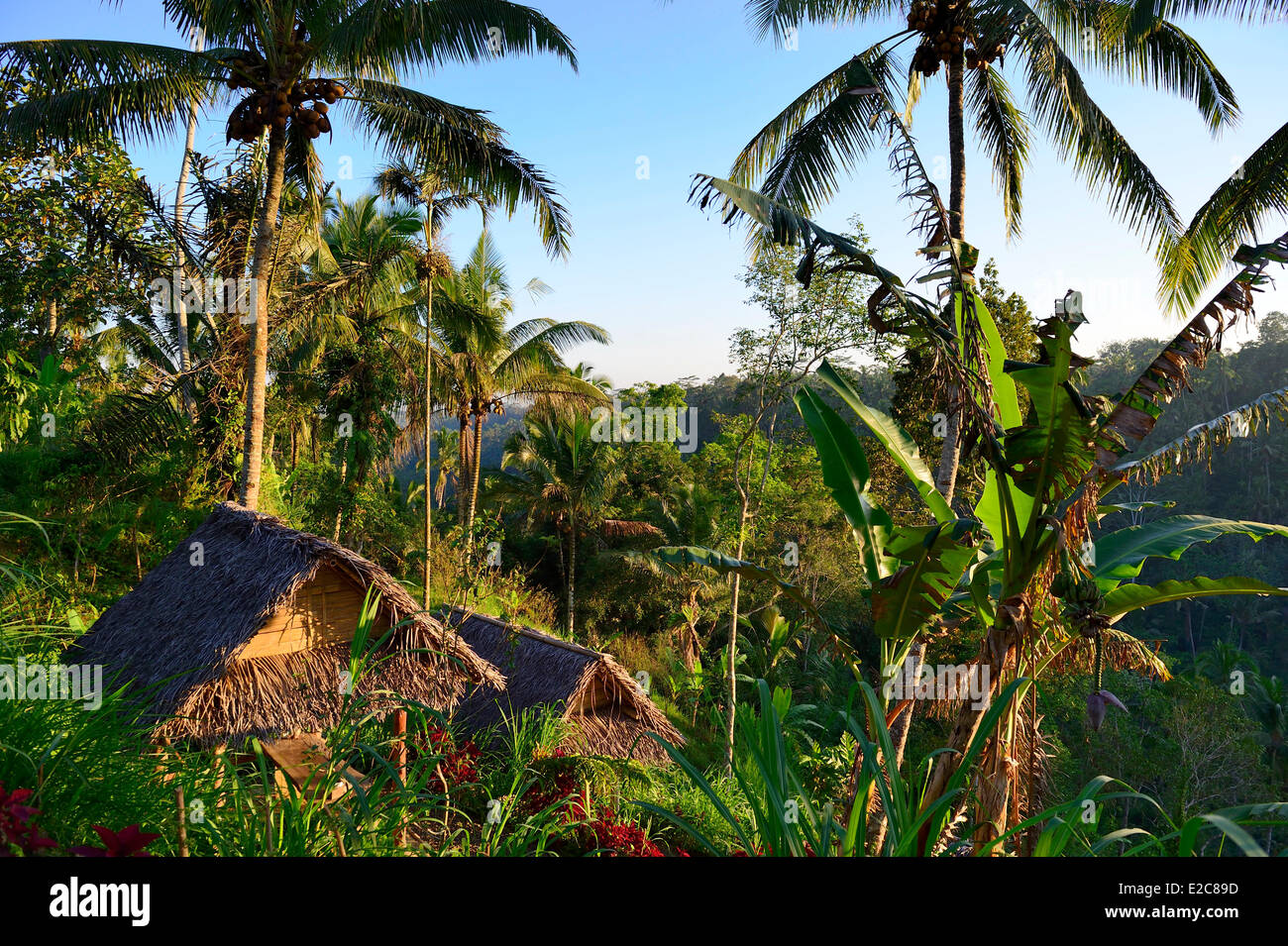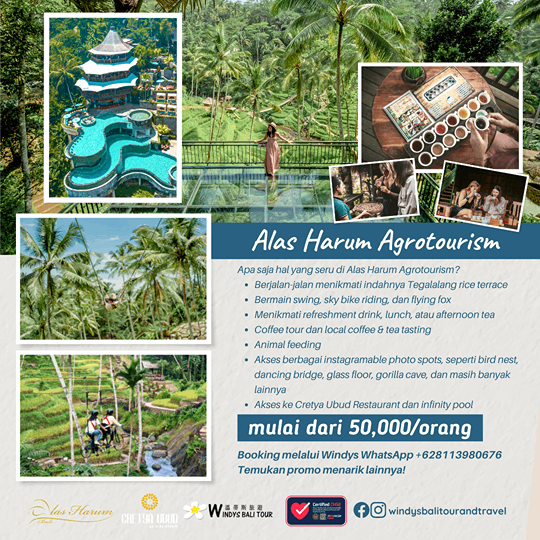Leading Factors to Experience Agrotourism in Ubud on Your Following Vacation
Wiki Article
Checking Out the Abundant Culture and Breathtaking Landscapes of Agrotourism in Ubud
Ubud, typically celebrated as the heart of Bali, offers an unique chance for those looking for to experience agrotourism that effortlessly mixes social richness with stunning landscapes. As travelers browse via Ubud's dynamic tapestry of practices, they are welcomed to discover the stories behind each cultural method and landscape attribute.Finding Ubud's Cultural Heritage
Snuggled in the heart of Bali, Ubud works as a dynamic center for those excited to explore the island's rich social heritage. Known for its imaginative customs, Ubud is a center where ancient methods meet contemporary expressions, developing a distinct tapestry of cultural experiences. Site visitors are drawn to its myriad of galleries, workshops, and holy places, each providing a glimpse right into Bali's imaginative and historic legacy.Central to Ubud's cultural allure is the Ubud Palace, a significant landmark that stands as a testimony to the area's royal heritage. The palace often organizes typical dancing performances, providing an authentic understanding into Balinese storytelling with dancing and songs. The roads of Ubud are lined with galleries showcasing jobs of both prominent Balinese musicians and emerging skills, showing the island's dynamic art scene.

Immersive Agricultural Knowledge

Moreover, Ubud's agrotourism initiatives usually include workshops on lasting farming techniques. These workshops emphasize the significance of organic farming, permaculture, and biodiversity conservation, commonly under the advice of knowledgeable specialists. They offer as an academic platform for travelers, cultivating a deeper appreciation for the intricacies of sustainable farming.
Furthermore, visitors can discover coffee and cacao vineyards, where they discover the procedures of farming and manufacturing. Directed scenic tours provide thorough descriptions of each action, from bean to mug or chocolate husk to delicious chocolate bar, boosting the overall understanding of these significant farming products.
These immersive experiences not only improve visitors' understanding of Ubud's farming heritage however additionally promote sustainable tourist techniques, guaranteeing the conservation of these cultural landscapes for future generations.
Picturesque Rice Terraces and Landscapes
Building on the immersive farming experiences, site visitors are attracted to the exciting breathtaking rice terraces and landscapes that specify Ubud's countryside. The legendary Tegalalang Rice Terraces are particularly distinguished, using a beautiful screen of Balinese ingenuity in farming. These balconies are not only useful but also function as a testimony to the harmonious connection between the Balinese individuals and their environment. The subak irrigation system, a UNESCO-recognized social heritage, showcases a old and lasting method of water management that remains to sustain local farming.As site visitors pass through the Full Article winding courses with the terraces, they are met breathtaking sights that extend across green fields, punctuated by persuading coconut hands and the remote silhouette of Mount Agung. The landscape gives a serene backdrop that invites reflection and admiration of nature's elegance (Agrotourism in Ubud). For those thinking about digital photography, the ever-changing light and shadows cast by the daybreak or sundown offer plenty of chances for recording magnificent photos
Beyond the balconies, Ubud's rolling hillsides and lush vegetation develop a varied tapestry that beckons exploration. Hiking trails meander with these landscapes, allowing visitors to link with the land and experience the peaceful rhythm of rural life.
Farm-to-Table Culinary Delights
Amidst the natural charm of Ubud's landscapes, the farm-to-table movement provides a genuine culinary experience that links visitors with the region's farming heritage. This strategy commemorates the cooperative relationship in between the land and its produce, with neighborhood ranches supplying fresh, organic components to Ubud's innovative chefs. Visitors are invited to take part in a gastronomic trip where the beginnings of each ingredient are transparently showcased.In Ubud, farm-to-table eating transcends simple intake; it ends up being an academic experience. Dining establishments frequently use guided scenic tours of the farms providing their cooking areas, permitting diners to witness sustainable farming methods firsthand. This link cultivates a deeper gratitude for the precise care that enters into growing the crops and elevating animals.
The cooking offerings mirror the abundant variety of Ubud's agricultural landscape, including recipes that highlight seasonal fruit and vegetables and typical pop over here Balinese flavors. From vibrant salads brimming with unique eco-friendlies to aromatic curries infused with fresh herbs, each plate is a testimony to the region's bountiful harvests.
Furthermore, the farm-to-table principles supports regional farmers and neighborhoods, guaranteeing that agricultural traditions are maintained while promoting economic sustainability. This movement emphasizes a commitment to quality, sustainability, and the party of Ubud's one-of-a-kind terroir.
Involving With Regional Craftsmens
Several site visitors locate themselves mesmerized by the intricate workmanship of Ubud's neighborhood craftsmens, whose work mirrors the area's abundant social heritage. These artisans, often masters of their craft, add considerably to Ubud's vivid social landscape. From traditional batik textiles to carefully carved wood artifacts, each piece narrates interwoven with generations of proficiency and practice.Engaging with these craftsmens provides a distinct possibility to delve deeper into Balinese culture. Numerous workshops use hands-on experiences, where visitors can discover methods passed down via centuries. These interactive sessions not just foster recognition for the artisans' skills however also supply a meaningful link to the area's background and more information traditions.
Site visitors can explore craftsmen towns such as Mas, renowned for its fine wood carvings, or Celuk, famous for elegant silver fashion jewelry. Below, one can witness the devotion and precision required to create each work of art. Acquiring directly from these artisans makes certain that the earnings sustain neighborhood neighborhoods and sustain conventional methods.
In Ubud, involving with local craftsmens is not merely a vacationer activity; it is an improving social exchange that enhances the agrotourism experience, leaving site visitors with a much deeper understanding and appreciation of Bali's creative heritage. - Agrotourism in Ubud
Conclusion
The expedition of Ubud's agrotourism provides an extensive gratitude for Balinese cultural heritage and all-natural grandeur. The combination of traditional dancing, hands-on farming, and breathtaking rice terraces develops a distinct tapestry of experiences that captivate visitors. The farm-to-table cooking offerings showcase the region's agricultural bounty, while interactions with neighborhood artisans give insight into Ubud's rich creative practices. Jointly, these aspects cultivate a much deeper understanding and admiration of Ubud's enduring all-natural and cultural attraction.Central to Ubud's social allure is the Ubud Royal residence, a significant landmark that stands as a testimony to the area's royal heritage.Ubud supplies a myriad of immersive agricultural experiences that allow visitors to involve deeply with the island's agricultural way of life.Structure on the immersive farming experiences, site visitors are attracted to the exciting scenic rice balconies and landscapes that define Ubud's countryside.Among the natural elegance of Ubud's landscapes, the farm-to-table activity supplies a genuine culinary experience that attaches visitors with the region's agricultural heritage.Several site visitors locate themselves captivated by the elaborate craftsmanship of Ubud's regional artisans, whose work mirrors the region's abundant social heritage.
Report this wiki page